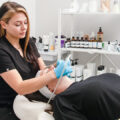Tues: 8:30am - 3:00pm
Wed: 12:00pm - 6:00pm
Thurs: 8:30am - 3:00pm
Fri: Closed
Sat: 8:30am - 12:30pm
Sun: Closed
Greenvale, NY 11548
What is Psychodermatology?


Psychodermatology is based on studies that show mental health, even mood, can have an impact on our skin.
Stress, for instance, can raise the level of cortisol in the body, which accelerates oil production and can make acne worse. Anxiety can cause poor sleep habits, leading to dehydrated skin.
The skin and brain develop from the same cell embryonically, so the link between them is obvious. Think about it: We blush when we get embarrassed. We get goosebumps when we are scared. These stressful situations trigger a skin reaction. What this means is our mental and emotional state can worsen more severe, long-term conditions like psoriasis and eczema.
Psychodermatology is complex
Psychodermatology practitioners treat skin the way a psychotherapist treats behavior—by learning how it responds to emotional and environmental stressors and helping manage those responses. Some treatment plans can include medication, therapy and stress-reduction techniques.
The practice of psychodermatology is based on a complex interplay between neurological, immunological, cutaneous and endocrine systems, known as the “NICE” network. The neurological system involves the brain and spinal cord. Immunological systems protect the body from infection and disease through various lines of defense. Cutaneous refers to the skin itself, while the endocrine system is a network of glands releasing hormones in our bodies.
Collectively and individually, these four systems impact skin health in the ongoing battle with environmental factors.
A psychodermatologic disorder is a condition that involves an interaction between the mind and the skin, according to the American Academy of Family Physicians. These disorders fall into three categories: psychophysiologic, primary and secondary psychiatric disorders.
Psychophysiologic disorders such as acne, psoriasis and eczema are often associated with skin problems that are not directly connected to the mind but react to emotional states, including stress.
Primary psychiatric disorders involve conditions that lead to self-induced cutaneous manifestations, such as trichotillomania and delusions of parasitosis, which is the mistaken belief the body is being attacked by bugs or other creatures.
Secondary disorders involve disfiguring skin disorders. The disfigurement can result in lowered self-esteem, depression or social phobia.
Most psychodermatologic disorders can be treated by a dermatologist, supplemented by anxiety-decreasing techniques or, in more serious cases, psychotropic medications.
Consulting with your dermatologist is the first step toward getting better. Your dermatologist will be able to diagnose your skin condition and prescribe a treatment suitable to your specific needs.
Skin conditions that are stubbornly resistant to medical treatment may be due to psychophysiologic disorders. It may be necessary to discuss lifestyle and personal habits with your dermatologist, including any social or occupational stress you may be dealing with.
The good news is, once a psychophysiologic disorder is identified, the condition responds well to treatment. Stress management techniques in tandem with medical care can bring acne under control, for example. Lifestyle and behavioral modifications may also be necessary to resolve some skin conditions.
Skin conditions linked to anxiety, depression and obsessive-compulsive behaviors may require some combination of dermatologic treatment and medications to manage the behavior. Working with a therapist may also be recommended.
The fact that the skin is so visible has also contributed to psychoanalytical theories and interpretations of skin diseases by psychoanalysts interested in psychosomatic medicine, according to the National Institutes of Health. Psychoanalyst Didier Anzieu described the dimension of the skin as a “psychological shell,” coining the term “Skin Ego.”
Essentially, certain skin conditions are linked with – and triggered by – changes in self-esteem.
The use of psychodermatology as a treatment for skin disease is widely accepted by dermatologists and other health care professionals around the world.
A key problem with skin conditions connected to psychodermatology is the condition tends to worsen if the underlying psychological issues are not addressed. In fact, with conditions such as acne or psoriasis, which are obvious on the skin, the potential embarrassment or anxiety can increase the outbreak, creating a vicious cycle.
This is why you should contact a dermatologist right away if you are experiencing a skin condition that appears just as you are going through difficult challenges in life. There’s no need to suffer or feel ashamed. Life is hard, but taking care of your skin doesn’t have to be.
Finding support
There are many dermatologic support groups and online resources devoted to helping people cope mentally and emotionally with a range of skin conditions. Here are just a few:
National Alopecia Areata Foundation
National Eczema Association for Science and Education
Obsessive-Compulsive Foundation
Let Walk-in Dermatology Take Care of You
If you have concerns about any skin condition and need dependable answers fast, you don’t have to wonder, worry or wait. Walk-in Dermatology is here to keep you healthy. Our team of dermatologists and experienced healthcare staff will address your concerns and provide the necessary care for all your skin conditions. We can set up a Video Visit and even prescribe medications remotely, or you can schedule an appointment with us online. The choice is yours. But don’t wait until the problem gets worse. Contact us today.








